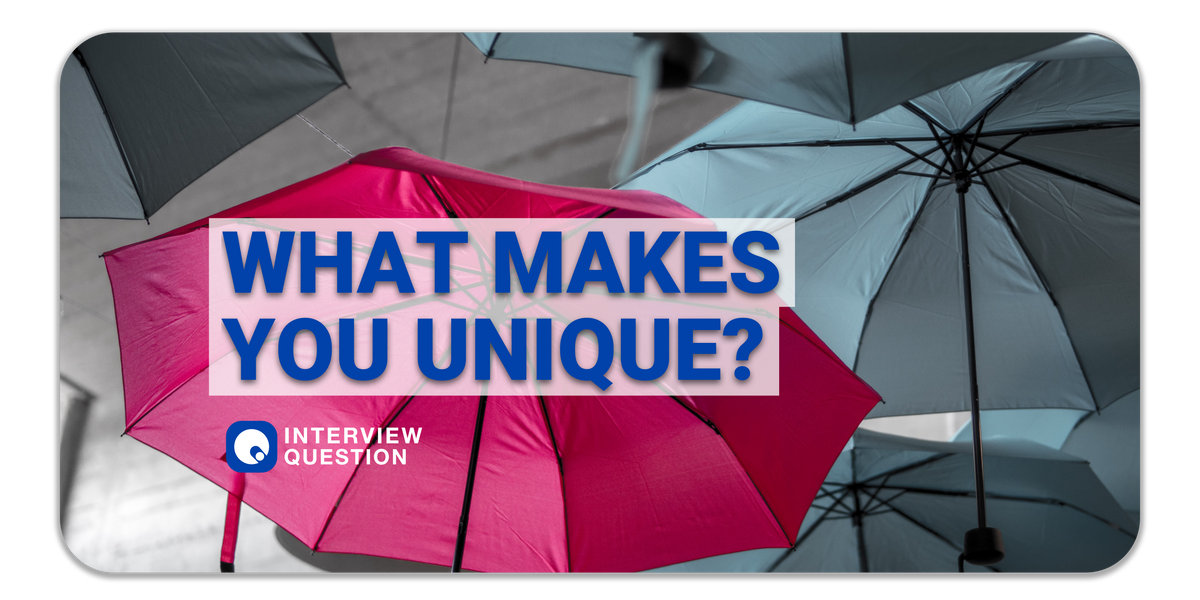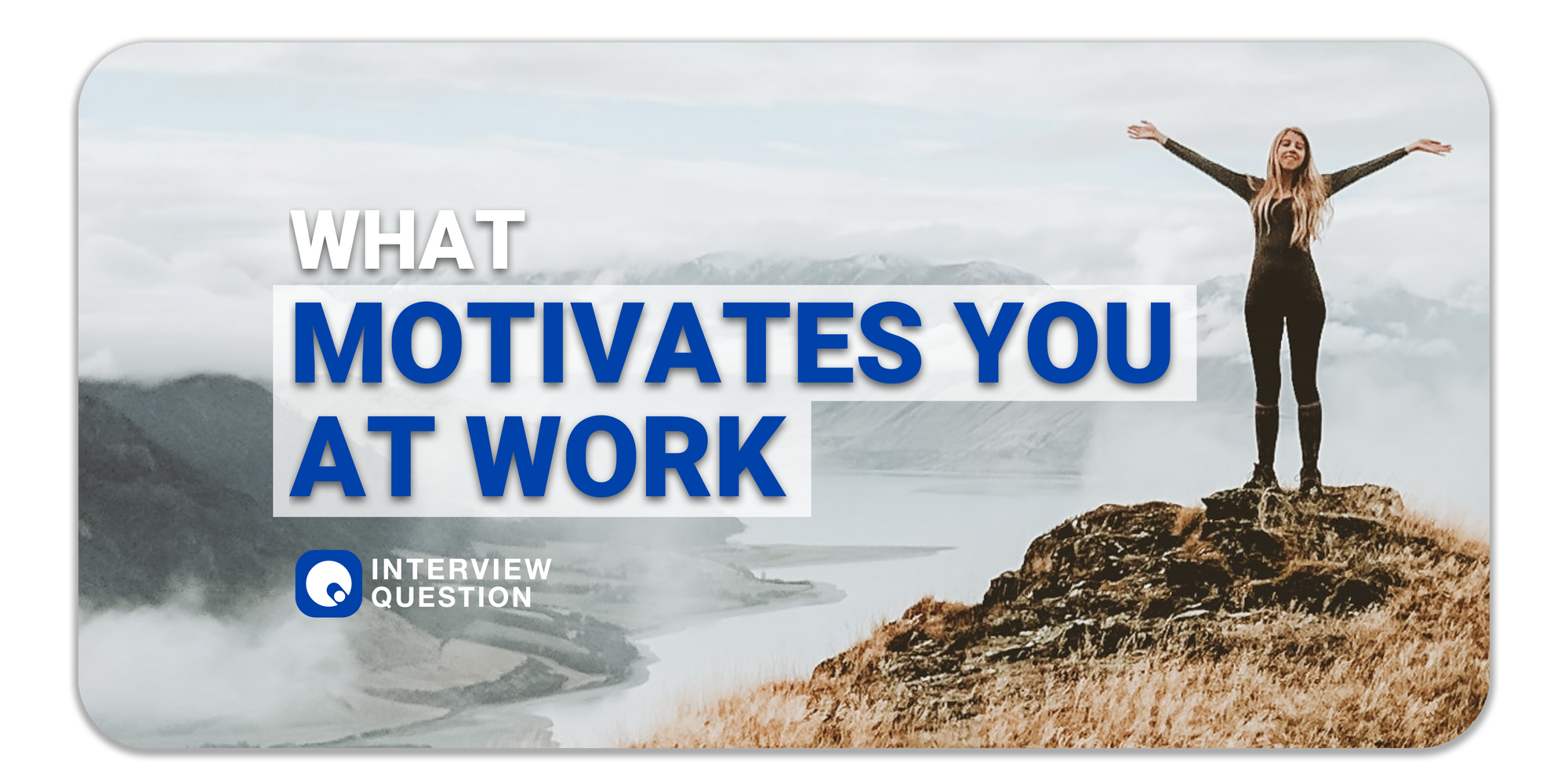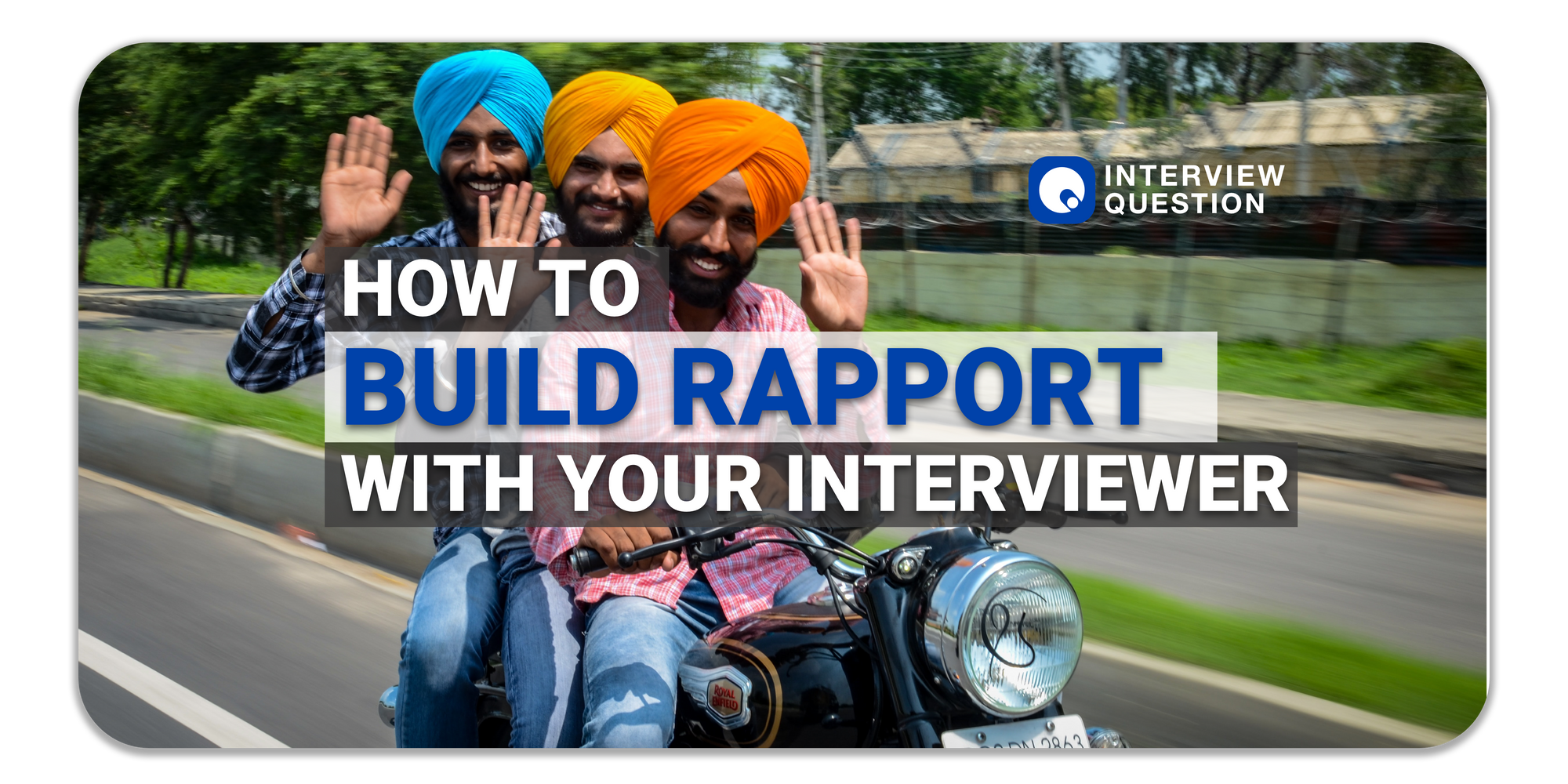What makes you unique? - interview question
Self confidence | Motivation | Cultural fit | Be honest and upbeat

The approach to how you can answer the qualities on what makes you unique is very situational. You cannot give generic responses and instead, you need to take into account your background, how you were raised, and what type of company or person you're interviewing for.
Regardless of what type of company/person/situation it is, there are some universal qualities which every personal brand should show.
Self Confidence
A hiring manager tries to perceive how you fit into the company and you try to determine how you fit within the job role. That's where the soft skill of self confidence comes in.
You need to show that you have a solid track record of being an excellent communicator with great delivery. Plus, you should show that have the ability to take on new responsibilities, and have some level of initiative. This kind of self confidence comes from experience and not being afraid to take on new tasks or challenges.
Being sure of yourself in light of challenging or unknown circumstances is a very difficult quality to develop, especially if you have shy or introverted personality traits.
One way to get around this before an interview is to prepare plenty of sample answers for every question you know you will be asked.
Since it is a scripted interview answer, you should feel confident enough to convey it and repeat it over and over until you get the message of what makes you unique across. Rephrase and craft your responses "in your own words" where possible to deliver a compelling answer. In an interview setting, this is your opportunity to shine.
Motivation
If you're interviewing for a highly technical position, it's important that you show that you have some level of skill in the technical arena. For example, if you're interviewing for a software engineer position, showing them that you understand the programming language and frameworks that are used within the industry are important.
An exceptional candidate tends to demonstrate their interest outside of the typical academic and work settings.
His skillsets and experience could come from pastime activities (learning from Quora, Techcrunch, reading books) or volunteer work - anywhere atypical is fine, since this shows they're not just driven to work 9-5 and go home. Such ideal candidates may pick up less common skills and knowledge which ends up being one of many transferrable skills they possess.
Some people can be great at their jobs, but still aren't motivated to do anything else outside of what they're paid for (and maybe not even that).
Those are the people that tend to get stuck in the same position for a long time because they're almost never going to move up in their position or get a new job. They lack ambition and progression, which is extremely important to most companies.
In most jobs, motivation tends to dissipate because of the monotonous work that can be done. However, if you can demonstrate that you are motivated to learn new things and are able to execute on new tasks, you show you bring strong contribution to the table with an unusual combination of skills.
Having personal ambition is in fact a very attractive quality for many employers as it shows you are clear on your career path you decided on and that you are actively working towards it.

What makes you unique in terms of adaptability?
Sample interview answer:
What sets me apart in terms of adaptability is my insatiable passion for learning and embracing new experiences. This burning desire fuels my ability to swiftly adjust to various tasks and situations, continuously expanding my skillset.
I am genuinely excited by the prospect of uncovering emerging trends, mastering innovative tools, and seamlessly adapting to any challenge that comes my way.
I possess an unwavering belief in my capacity to conquer any skill or overcome any obstacle, regardless of how unfamiliar or daunting it may initially seem.
This self-assurance allows me to effortlessly navigate fast-paced environments, as I refrain from doubting myself or wasting valuable time stressing over the novelty of the situation. Instead, I dive right in, approaching each new endeavor with focus and determination, ensuring its successful completion.
Cultural Fit
Cultural fit is one of the most important aspects of an interview. It's also one of the most difficult to quantify and describe.
This is where you have to be honest with yourself and think about how your personality traits will fit into the company culture.
Your expressiveness and interest becomes the qualities that make you unique. As cultural fit can come in an indirect behavioural interview question, it's important that you have a genuine response to the question which shows off your personality.
The best responses to culture fit questions come from anecdotal evidence. A sample answer, for example, could be if one of the company values is being innovative and you were part of a team that had innovative ideas in the past, mention it.
Likely you have adopted an experimental process to get things going - give strong, concrete examples here - possibly you stepped out of your job position to help a team with your experience.
The structure of an interview is one where you build rapport with the interviewer. Mentioning a shared interest or past experiences help you to stand out as more unique than the rest of your competition. To make a strong impression and really show that you are special, it is helpful to highlight a personal trait that you have that isn't common amongst other candidates.

Such personal quirks give you the slight edge over your competing job candidates.
You could also talk about how you love working with fast-paced environments and that you thrive off new challenges every day or how excited you get when a problem gets solved.
What makes you unique in terms of work ethic?
Here's a sample answer you can consider using:
What sets me apart in terms of work ethic is my unwavering commitment to professionalism and excellence. I view my career as an essential aspect of my identity and take immense pride in the work I produce. Every task I undertake is a reflection of the kind of person I am, and I always strive to deliver beyond expectations.
One aspect of my unique work ethic is my unyielding dedication to self-improvement. I firmly believe that there is always room for growth and development. I constantly seek opportunities to upskill myself, learning new techniques and acquiring knowledge that allows me to excel in my role. I am not satisfied with simply maintaining the status quo; I push myself to surpass my previous accomplishments.
In my pursuit of continuous improvement, I maintain a competitive mindset that drives me to outperform my past self. I set high standards for myself and consistently challenge my own abilities. By meticulously evaluating my performance, I identify areas for enhancement and take proactive measures to refine my skills. It is only when I can look back and witness personal growth and progress that I consider a job well done.
My dedication to professional growth is fueled by a deep-seated passion for what I do. I genuinely enjoy my work, and this enthusiasm permeates my approach. Regardless of the task at hand, be it a routine assignment or a complex project, I consistently bring a high level of energy and enthusiasm. This unwavering passion not only boosts my own productivity but also inspires those around me.
In summary, my unique work ethic is characterized by my unwavering commitment to professionalism, my relentless pursuit of self-improvement, my competitive mindset, and my genuine passion for my work. These qualities set me apart and drive me to exceed expectations while ensuring continuous growth and personal development.
What makes you unique in terms of teamwork?
Our sample answer:
What sets me apart in terms of teamwork is my genuine belief that collaboration is the key to success in any industry and role.
I truly understand the value of diverse perspectives and ideas, and I strive to create an environment where every team member feels valued and empowered.
I am dedicated to helping my teammates find their voice and unlock their full potential, as I know that their unique contributions are essential to our collective success.
I am driven to motivate others to take action, inspiring them to reach new heights and excel in their roles.
Additionally, I am committed to providing continuous feedback, celebrating achievements, and providing unwavering support to my teammates, which enables us to grow together and foster a culture of collaboration and success.
Be Honest and Upbeat
Nothing turns off a potential employer more than a high strung individual. Job seekers who have been through too many job interviews over a short span of time tend to lose the enthusiasm and liveliness - this can unintentionally come off poorly on the job seeker's personality traits.
Stressful situations often puts the pedal to the meddle. How you respond in trying times makes you unique and shows a lot about how you can function in a stressful situation.
Don't let your reactions, a bad answer or stress get the better of you. In an interview setting, employ certain coping methods to manage the stress that you may be feeling - deep breathing exercises, staying hydrated, and sticking to a routine are all helpful tools to combat the biological process of stress. Maintain a positive outlook with an upbeat approach through the application process.
After all, if you don't get the job you applied for, it's important that you're able to pick up the pieces and move on to something else. Having a positive attitude will definitely help with that.
Why do employers ask "What makes you unique?"
Employers often pose the question, "What makes you unique?" during interviews to gain insights into a candidate's distinct qualities and what they can bring to the company. This question is not meant to trick or stump you; rather, it allows employers to understand your individual perspective and what sets you apart from other applicants.
While your resume provides a brief overview of your qualifications, employers are looking to uncover aspects about you that may not be explicitly mentioned.
By asking this question, employers seek to learn about any exceptional skills, abilities, or experiences that may be valuable in the role. Perhaps you possess a remarkable talent or expertise that is not commonly found in other candidates.
It could also be that you have developed and refined certain soft skills that are highly relevant to the position.
Regardless of whether you have a unique attribute or not, this question serves as an opportunity for you to demonstrate your understanding of the job description and the specific needs of the employer. Through your answer, you can showcase how your qualifications align with their expectations.
Conclusion
Outside of social media, we are inundated everyday with messages from networking events to company career pages - each trying to give us direction and focus on where we are going with our careers and what we need to do in order to get there.
There can be an extended laundry list of things that make you unique, and frankly, there is never enough time in any interview for the hiring manager to ask the real questions and see the real you. What it comes down to is whether you stand out from the crowd or not in those short face-to-face moments.
Here's a final piece of career advice - continue being genuine, respectful and exercise active listening skills. Include as many strong examples on your past experience and "laundry list" skillsets to allow for a well rounded discussion about you as an individual, so that the hiring manager can get an accurate gauge on whether or not you would fit into the company.
You need to stand out above everyone else and look special, even if it's just by being personable and that little bit more enthusiastic in your interview than they are.

